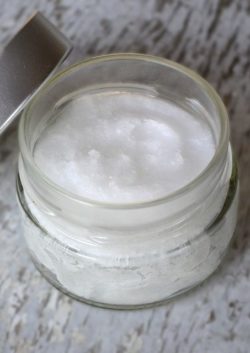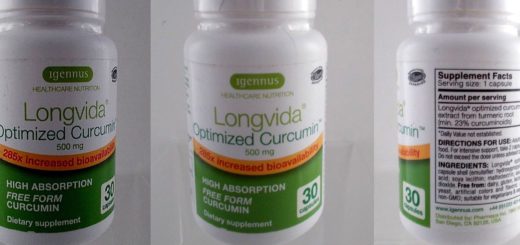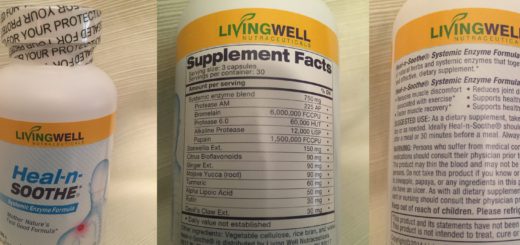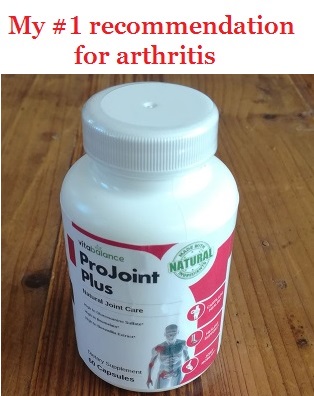Is Coconut Oil Good For Joint Pain? – The Pros & The Cons

Coconut oil is one of the recent “superfoods”of this century. People say it has so many benefits – that it starts to be considered good for anything.
From headaches to diabetes, coconut oil seems to help any condition. But what about arthritis?
Is coconut oil good for joint pain? I know it’s effective for a lot of things – but does it have any benefits in arthritis as well?
To be honest, I found out lots of positive things about it:
- It’s surely not a cure for arthritis
- But it help a lot of symptoms
However, I also found out the negative side – because there is one. Coconut oil isn’t as perfect as it seems, at least not for arthritis.
So if you’re curious to see the whole picture, here it is.
What’s So Essential Inside Coconut Oil?
People recommend coconut oil for so many health problems because it’s really good. That’s the only explanation.
But why is it that good? What does it contain that makes it so effective for so many conditions?

The point is that there are 3 different types of fats inside coconut oil.
Yes, you probably heard that fats aren’t any good – but in this case, it’s them behind the benefits of coconut oil. So let’s take them by turn:
1. Saturated Fat – it’s the higher percent of fat from coconut oil (about 80%).
There are several acids that make up this saturated fat, but the most important one is lauric acid, which is almost 50%:
- Once it gets into the body, lauric acid fights off infections and bacteria.
- But up to this poin – studies can’t show it has any benefits for joint pain.
2. Monosaturated Fat – though there’s a pretty low quantity in coconut oil, we have to count monosaturated fat in.
In this case, it’s made entirely of oleic acid:
- This is said to protect against cancer, on the long term.
- It also seems to help cartilages and osteoarthritis – because it’s an Omgea 9-Fatty Acid.
3. Polyunsaturated Fat – there’s an even lower quantity of this fat inside coconut oil, and it’s made entirely of linoleic acid.
But there’s something special about this acid:
- Out body doesn’t produce it alone.
- So we have to take it from foods.
- Regarding joint pain – linoleic acid is said to protect cartilages and promote bone health.
So at first sight, 2 of the fats from coconut oil seem really helpful:
- monosaturated
- polyunsaturated ones – but they’re under 20%
The major one, saturated fat, doesn’t seem to have any benefit for the joints. At least I haven’t found out anything clear.
But it’s time to take a close look, because this oil has both good and bad points.
THE PROS
1. Fights Inflammation
That’s probably the most important thing about coconut oil.
It can do a lot – but none is as important as its anti-inflammatory proprieties. At least when it comes to joint pain, that is essential.
So how exactly can it reduce inflammation?
According to a recent study, it’s the high percent of lauric acid that makes the difference. There’s something special about this substance:
- it can decrease inflammation
- it’s effective even when applied directly on the skin
So you don’t necessarily have to eat coconut oil to get this benefit:
- You can simply apply it on the painful spot
- And it should decrease the swelling pretty shortly
But there’s one thing to keep in mind:
- This study tested out virgin oil
- So I doubt that every coconut oil you see in shops could do that
- I recommend you to buy an organic form – if you want to get all of its benefits
Obviously, coconut oil can also decrease the pain – as long as it’s caused by inflammation. Lauric acid is again the responsible, because it increases the blood supply in the area where it’s applied.
The other acids inside coconut oil also help – but as they’re not in a high quantity, it’s the lauric acid that gets all the credit.
2. Extra Lubrication
Have you ever seen coconut oil in pain relief lotions? I have.

There aren’t a lot of products that contain it – but you can find some if you take a close look.
The explanation is simple:
- just like many oils, coconut oil is an excellent lubricant
- for this reason, it’s a great solution for stiff joints
All you have to do is to apply it on your skin and massage the area. As it’s an greasy substance, it can penetrate the skin much easier, compared to creams.
But ff you want to make the most of it:
- use coconut oil after taking a hot bath – as your joints are already loosened up
- as you add the oil, they will get even more lubricated
- in this way, the stiffness should stay away for a longer while
Another thing is does is to increase the blood flow around the joints.
That’s why I recommend you to massage the area after you applied the oil on it – because it will improve blood circulation immediately.
You can use this hack everyday. Simply apply some coconut oil after your daily shower and then massage the area. Your pain may not go away immediately, but your stiffness should.
3. Anti-Stress Solution
I’m not talking about that stress when you can’t finish your work project in time. Though coconut oil could help that one too.
But in this case, I’m talking about the stress caused by arthritis.
If you have this condition, you surely know how frustrating life can be:
- You wake up one morning and you’re able to get out of bed
- In case you’re home alone, things get even worse
- Or what’s it like to be really tired, but not being able to fall asleep because of the pain and stiffness?
These are just some basic examples, but arthritis can be a very stressful condition – especially if you have a severe form.
So how can coconut oil help that?
According to a 2015 research, this oil has some great proprieties to relieve stress:
- You can use it internally
- But you can also use it for massage
I personally prefer the last option – but you can use coconut oil for cooking instead of salads, if you don’t like the taste.
If you prefer to use it topically, get back to the previous paragraph because you can read more about massage with coconut oil there.
So when it comes to the stressed caused by arthritis – coconut oil can be a really good alternative treatment.
4. Fights Oxidative Stress
Most of the foods recommended for arthritis also have this propriety, besides fighting off inflammation. And obviously, coconut oil couldn’t be missing from this group.

So how exactly does it fight oxidative stress?
Well, coconut oil is an antioxidant so it fights back free radicals:
- These are molecules that get into our body naturally
- But they damage the cells and cause illness and aging on the long term
However – this process is natural so everyone has free radicals inside the body.
There’s nothing pathological, it’s just a normal thing. So you can’t really stay away from it, no matter what you do.
But there’s an interesting thing. Scientists believe that free radicals and oxidative stress produce joint and cartilage problems on the long term.
That makes sense – as OA mostly appears in older people, who have a lot more free radicals than a baby.
So that’s why antioxidants are so important:
- They manage to fight the free radical molecules
- So they protect the body on the long term
If you consume lots of antioxidants, you probably won’t notice any change too soon.
But if you follow the diet for a while – your joints can start feeling less painful and stiff. Just give it a shot and you will see.
THE CONS
1. Boosts Immunity
Besides decreasing inflammation, coconut oil has another amazing propriety – it improves your body’s immunity.
That sounds like a great thing for almost everyone, because immunity is essential. So why is it a bad thing then?
Well, if you have RA and any form of anti-inflammatory condition, coconut oil may not do you so much good.
When you have this kind of conditions, your body mistakenly attacks and destroys itself. So what does medicine recommend in this case?
- Decreasing your immunity
That’s what most drugs for RA do:
- Once your immunity is decreased, your body won’t have much power to attack itself
- Obviously, it won’t have much power to attack bacteria and infections – but that’s another story
Well, here’s the point. Boosting your immunity will also worsen your RA:
- Your body will get stronger
- And it will start attacking itself again – destroying your joints and causing pain and inflammation
That’s why people with RA or any auto-immune disease should stay away from immunity boosters.
Now – coconut oil isn’t a real immunity booster, compared to special supplements. So you shouldn’t avoid it for this reason.
But if you have osteoarthritis – it’s even better:
- OA is caused by cartilage damage
- So it doesn’t have anything to do with immunity
For this reason, coconut oil won’t worsen OA by any means.
2. Saturated Fats
Now – lauric acid works as an anti-inflammatory. But saturated fats are generally not good for your body:
 they increase LDL cholesterol
they increase LDL cholesterol- and this is a high risk factor for heart problems
Besides, saturated fats aren’t very good for joints either:
- On the long term, they weaken the cartilages – especially in the knees
- This means that they can lead to osteoarthritis in time
Obviously, you would have to consume high quantities to get OA only from saturated fats.
But before getting OA – you could start developing heard problems, which is even more serious.
Out of the foods with high saturated fats, coconut oil is probably the healthiest one:
- It also contains other types of fats, which are far from harmful
- Even the saturated linoleic acid has enough benefits, including anti-inflammatory proprieties.
So it’s hard to find a mutual point, but saturated fats aren’t amazing for arthritis.
That’s why I personally wouldn’t consume coconut oil daily. Using it topically is totally fine, but eating it isn’t. At least in my opinion.
My Verdict – Is Coconut Oil Good For Arthritis?
Short answer: It’s good, as long as you use it on your skin or at most for cooking.
But if you prefer to take it orally, I’m not sure it’s that beneficial.
So if you have RA or any other auto-immune disease, I don’t recommend you to eat coconut oil raw:
- It can boost your immunity
- So it could worsen your arthritis on the long term – assuming you ate it for a long while
On the other hand, if you have OA or swollen joints – it’s a lot safer.
But I would still not recommend eating it raw, because you’re increasing the risk for heart problems. Besides, it’s a lot easier to just apply it on your skin.
Therefore, coconut oil is definitely good for arthritis and joint pain – but it has a few warnings.
As long as you use it on your skin, I think it’s a great remedy and it can decrease your swelling.
It’s not my top recommendation, because I didn’t experience great benefits from it. But if you think it might help you, I say you give it a shot. You have nothing to lose, after all.
 they increase LDL cholesterol
they increase LDL cholesterol




I’ve had different results with coconut oil, so in my view it’s not a real cure for joint pain. I have a problem in my lower back (most likely SI pain) and I tried different brands of coconut oil, virgin, organic and so on. I didn’t work too much, and my pain was only soothed temporary. So I don’t consider it as a valuable thing, sorry. I saw it has studies, but it just didn’t work out for me.
I once heard about pills with coconut oil, and I was wondering if they were more helpful. Where could I find any, do you have any idea? Do you think they are more valuable than the oil itself? Have you ever tried them out? Sorry for all the bunch of questions but I couldn’t find anyone that would answer my questions, so I’d really appreciate it.
Hi Brit, questions aren’t a problem, it’s my pleasure to help you find an answer to them.
So first of all, I did a quick search and I found out about several supplements based on coconut oil. So there are oral forms, but I never tried any up to this point.
I don’t know if you read the article carefully, but I don’t really recommend taking coconut oil orally. I know I was talking about raw oil in the post, but it’s basically the same in supplements. Because you’re still taking it orally, which I don’t recommend. Why? From what I read it may boost immunity, which is not something you want in auto-immune conditions. I have RA, so I don’t really want that.
Now, I’m not sure if coconut oil pills would really boost immunity much, but that’s what research says. So I personally prefer to stay away from them, just to avoid the risk.
However, you said you have SI dysfunction, which isn’t an auto-immune condition. So I’m pretty sure coconut oil pills won’t harm you. But if you ask me, they won’t help you a lot either, simply because coconut oil isn’t such a strong anti-inflammatory. And that’s what you need in SI dysfunction.
So turmeric is my #1 recommendation for your problem, because it’s the best herb for inflammation. You can give coconut oil pills a try if you really want, but I would get straight to turmeric. You said you didn’t have great results with coconut oil applied topically, so I doubt the supplements would change much. But either way, you can find several brands of coconut pills on Amazon, eBay and other websites. I think there are some in shops, but I never checked out, so you might want to do that. Hope this helps.
I have always known that coconut oil is good for one’s skin and healthy to eat. However, I didn’t know it has quite so many health benefits, especially in arthritis. I suffer from this problem and that’s why I was looking for alternative remedies.
I didn’t know that it helps with pain and that it fights inflammation – is that only with arthritis or also other kinds of pain? I have my husband complaining of back pain quite often (he does not have arthritis).
I’m happy you wrote both sides of the story with coconut oil. Recently I read an article on the Daily Mail about how coconut oil is the worst thing for a person. You have cleared that up for me now! As long as its used in moderation and not eaten it’s ok! Thanks
Hi Rosie, coconut oil does remain a good remedy for arthritis, despite all the bad things that are said about it.
Now, I don’t know what kind of arthritis you have – if it’s an autoimmune form, it’s not the best thing ever. But anyway, if you use it just for massages – it’s totally fine, it can really help.
So if you have an auto-immune arthritis, there are several alternative remedies you can try (based on my experience).
If you have osteoarthritis, I also have a list with some natural treatments that can help you.
Now – regarding your question about coconut oil. It can help pain and inflammation in general, not just the one caused by arthritis. So it could help your husband’s back pain as well.
But if he has a stronger pain, coconut oil might not be enough. So here’s what I advise you:
– Try massaging his back with coconut oil for about a week
– If he feels better, it’s great. You can continue with this remedy
– If not, he probably need something stronger. So I would recommend turmeric, which is the strongest natural anti-inflammatory (so it’s surely going to help).
But unlike coconut oil, turmeric works best as supplements (because they contain some extracts, not just the powder alone). So he should use a supplement that has 3 things: turmeric powder + turmeric extract (curcuminoides) + bioperine.
My personal recommendation is this supplement – because it’s cheaper than most and it has some higher doses. But I have a longer list, in case you need several alternatives (just that some are a bit more expensive).
So depending on how he reacts to coconut oil, you should tell if he needs something stronger (like turmeric) or not.
Also, you can use coconut oil for cooking (if you’re not using it already). If you cook with it, you’re not really eating it – so it’s totally safe.
In case you need some other advice or if there’s something else you want to ask me, please let me know anytime.
Does it help stiffness too? I wake up every morning with stiff legs and I was wondering if any oil could help me. I don’t have arthritis or pain or anything, only hard legs after I wake up. I’m looking for something natural that I can apply in the morning. Could coconut oil help? Do I have to melt it or I can use it as it is?
Hey Charlie.
I can’t tell you for sure, but coconut oil should be able to decrease stiffness. But you didn’t mention how long it usually lasts:
– if it’s more than 30 minutes, you probably need some pills (because they work on the inside)
– if it goes away faster, coconut oil alone should help
My recommendation is to heat it up and apply it melted:
First, it’s liquid and much easier to apply.
Secondly, heat is one of the best remedies for stiffness. So combined with the substances inside coconut oil, it’s surely going to help.
On the other hand, I doubt that thick coconut oil would help you much. So melted (and hot) it’s a much better choice in my opinion.
Try this and let me know how it goes.